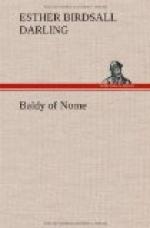“Too bad that Ben’s efforts are wasted on a dog that will never be much to boast of, at best. He has strength and patience, but that is about all. I believe, like George, that he lacks spirit.”
Of course there had been no dramatic incidents in his life like those of Jack McMillan’s; he was no paragon like Kid; nor had he manifested the marvelous intelligence of old Dubby. But on the other hand, there was really nothing tangible so far in his career to make her feel that he was incapable of development.
“You’re wrong about Baldy,” said “Scotty” thoughtfully. “I have been watching him ever since the Juvenile Race; and he has certain latent qualities that will make a good general utility dog of him for even a racing team. He may not prove a leader, but he’s dependable, not apt to lose his head and stampede, as do some of the more spirited ones. He’ll do his modest part yet, in a big event.”
“Well, you’ll have to show me,” exclaimed the Woman, whose speech was now and then tinged unconsciously by her close fellowship with the Wonder Workers.
Even Dubby’s favorable notice was now frequently attracted toward Baldy; and the fact that he was aspiring to belong to the Racing Team was mitigated to a certain extent in the venerable huskie’s sight by a puppy-hood spent amongst the working classes. He was not born to an exalted position, a natural aristocrat, like Tom, Dick or Harry; and would not, as did they, glory in it ostentatiously. But if it came, he would accept it with a solemn sense of obligation to do his best anywhere it pleased his master to place him.
Unlike the Tolman brothers, McMillan, Irish and Rover, he did not curry favor by the happy accident of birth, beauty, or personal magnetism; and so Dubby began to bestow upon Baldy, for his modesty and industry, an approbation not accorded by him to many of the others in the Kennel. And Dubby’s opinion of a new dog was worth much, for “Scotty” Allan himself respected the experience and sagacity that governed it.
Possessed of the colorings and markings of his wolf forbears, as well as their keen instinct in trail emergencies, Dubby combined with this the faithful, loving nature of the dog branch of the family.
In his merest infancy he had given promise of unusual ability—a promise more than fulfilled.
When hardly more than three months old he had learned the orders “Gee,” “Haw,” “Mush” and “Whoa” perfectly. And he was beginning to think a little for himself when the rest of the litter were still undecided whether “Gee” meant to turn to the right paw side, or the left paw side; and were hardly convinced that “Mush” was “Go on” and not a terse invitation to breakfast.
His later accomplishments were many. He could pick up an uncertain trail when concealed by three feet of soft, freshly fallen snow; he could tell if ice was thick enough to carry the weight of a loaded sled, when the most seasoned trailsman was deceived, and he could scent a camp for four or five miles with the wind in the right direction. Never but once in his life had he been known to take the wrong route to a given point. Then he mistook the faint glimmer of Venus, as she dimly showed above the dark horizon, for the lantern on the ridge-pole of a road house; which was poetic, but misleading, and proves that even dogs can come to grief through too much star gazing.




